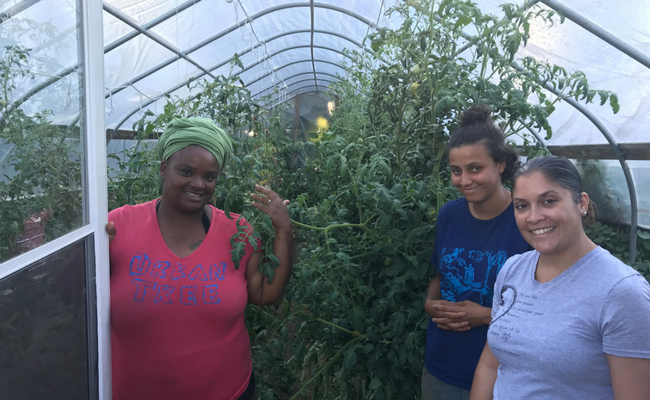 As part of our continued mission to improve agricultural sustainability, The FruitGuys Community Fund awarded $42,913 to 10 small American farms and agricultural nonprofits in May. The 10 recipient farms are spread across the U.S. serving a wide spectrum of communities.
As part of our continued mission to improve agricultural sustainability, The FruitGuys Community Fund awarded $42,913 to 10 small American farms and agricultural nonprofits in May. The 10 recipient farms are spread across the U.S. serving a wide spectrum of communities.
The 2017 grantees are: Chicago Patchwork Farms, in Chicago, IL; Foxtrot Organic Farm in St. Charles, IL; Byars Family Farm in Ardmore, OK; Songbird Farm in Unity, MN; Bertrand Farm in Niles, MI; Soil Born Farms in Rancho Cordova, CA; Marsteller Farm in Freeland, MD; The Growing Club – Sarvodaya Farms in Pomona, CA; Blackhawk Courts Farm and Garden in Rockford, IL; and Urban Tree Connection – Neighborhood Foods Farm in Philadelphia, PA.
Chicago Patchwork Farms
Chicago Patchwork Farms is a no-till, organic, half-acre urban farm in Chicago, IL. They received a $5,000 grant to fund the purchase of an ice freezer, solar panels, and a lean-to structure, and extra coolers and compost to support their new Neighborhood Greens Program.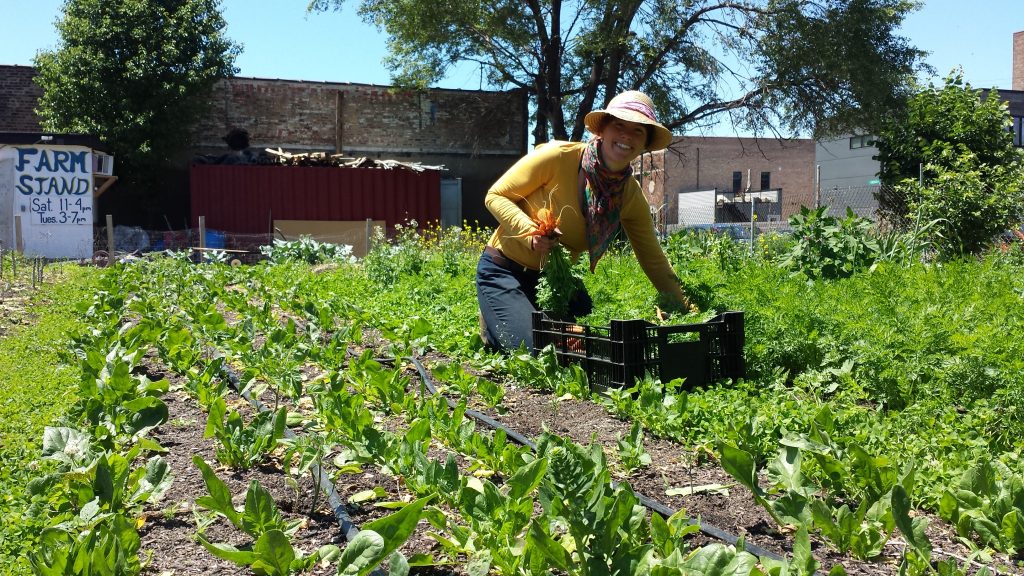
So far, Chicago Patchwork Farms has constructed both a new 750-square-foot section of their farm that’s devoted to growing bunched greens, and a structure to protect their ice freezer, which is on order and will arrive shortly.Partly in response to rising costs, they decided to sell some of their produce at a neighboring farm’s farmers market, and are on the lookout for more locations where they can sell their vegetables. These new partnerships are going well, with one collaboration with a local nonprofit organization, the Love Foundation, being a particular success.
Delays in getting the ice freezer have slowed the project down slightly, but according to Elise Robison, a farm partner, things are looking good so far. She stated that “Our FruitGuys funding for free samples allowed us to open a dialogue about our farm and growing practices. The chance to try our greens was explanation in itself why we are a little more expensive than grocery stores. The majority of our bunched greens customers are now regulars who shop with us every week. We have gained trust based on our quality, and some have started to branch out and try different types of cooking greens we grow: exotic mustards, radish greens, carrot tops, kale, international turnips, herbs, spicy flowers, and even highly nutritious beet greens!”
Foxtrot Organic Farm
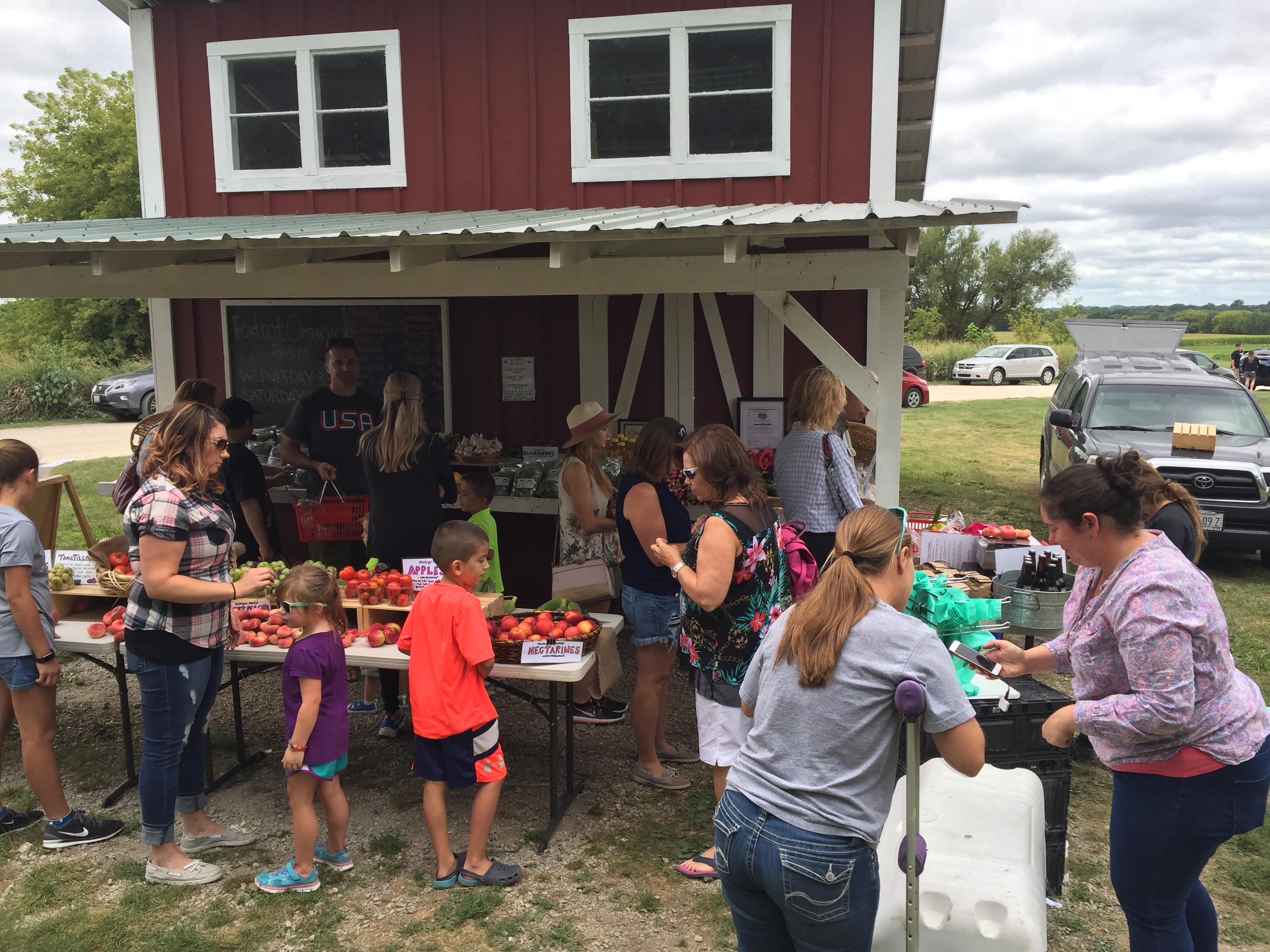 Foxtrot Organic Farm is a 6-acre certified organic farm in St. Charles, IL, that grows diversified fruits, vegetables, herbs, and cut flowers. They received a $3,359 grant to establish hedgerows, increase soil health, and minimize tillage.
Foxtrot Organic Farm is a 6-acre certified organic farm in St. Charles, IL, that grows diversified fruits, vegetables, herbs, and cut flowers. They received a $3,359 grant to establish hedgerows, increase soil health, and minimize tillage.
Foxtrot Organic Farm’s sustainability projects have three core purposes: (1) to build soil and prepare new ground for production; (2) to preserve soil structure and minimize labor hours spent weeding through the purchase and integration of a tilther tool; and (3) to create a perennial flowering hedgerow to provide beneficial insect habitat.
So far, Foxtrot has successfully purchased and received over 100,000 pounds of organic compost from Midwest Organics Recycling. Of that amount, half has already been spread to new areas of production, both to increase fertility by providing more organic matter, and to prevent erosion/nutrient leaching. Foxtrot has also acquired a tilther tool and purchased lavender plugs for their hedgerow.
Things have been very busy at the farm this year, but the farmers have found time to meet with Rep. Cheri Bustos (D-IL) to discuss the farm’s goals and its impact on the local community, and they’ve even met with a journalist from This American Life to discuss the upcoming 2018 Farm Bill.
Byars Family Farm
Byars Family Farm, a 5-acre farm in southern Oklahoma, within the Chickasaw Nation, received a $5,000 grant to build a hoop house and fund a mulch layer.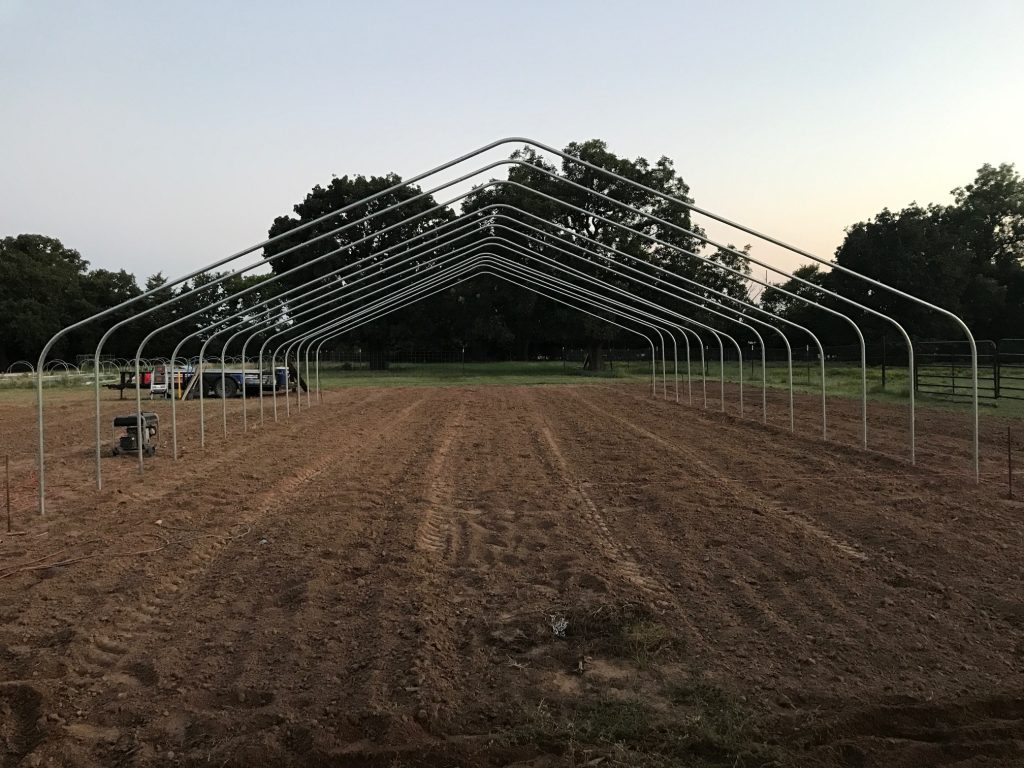
So far, Byars Family Farm has completed the construction of the mulch layer, and, after some initial complications, it has helped stop the spread of water disease in their high tunnel and has also increased water conservation.
As for their hoop house, the initial setup was delayed due to the Oklahoma weather and some other issues with removing plants before preparing the ground to construct the tunnel. But it is now up and running.
Songbird Farm
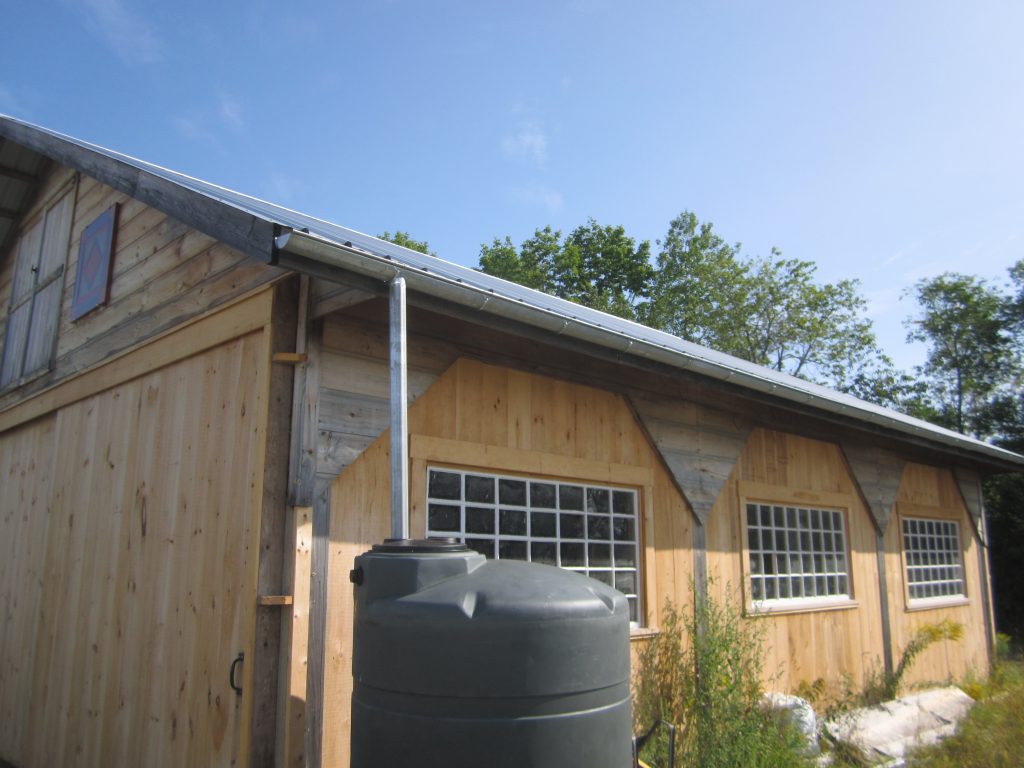 Songbird Farm, a 13-acre farm in Unity, ME, grows certified organic vegetables, grains, and stone-ground flour and received a $2,966 grant to fund a rainwater catchment system.
Songbird Farm, a 13-acre farm in Unity, ME, grows certified organic vegetables, grains, and stone-ground flour and received a $2,966 grant to fund a rainwater catchment system.
All the preparation work has been completed, with parts sourced and locations scouted for their water collection system. So far they have installed the gutter brackets, assembled and installed the gutter and downspout, and assembled and installed the water cistern on the south side of the barn. They are ready to purchase a water pump.
Their initial timeline was delayed slightly, but they expect to have the system completed by October, which should set them in good stead for next year’s growing season. Part of the delays earlier in the year were caused by the weather, which has reinforced the importance of creating a rainwater catchment system. Having a surplus of water to help them through periods of drought will be a relief in coming years.
As the project has not yet been concluded, it’s too early to tell how successful their grant has been, but initial signs are good. They’ve received lots of interest from local media, which will help raise the profile of sustainable farming in Maine.
Bertrand Farm
Bertrand Farm is a nonprofit educational farm in Niles, MI, whose mission is to connect people to local food. Their $4,991 grant helped them establish a 500-foot perennial food project on a transitioning orchard site.
Work on the linear food forest plantings is mostly complete. These include 560 square feet of diverse perennial plantings: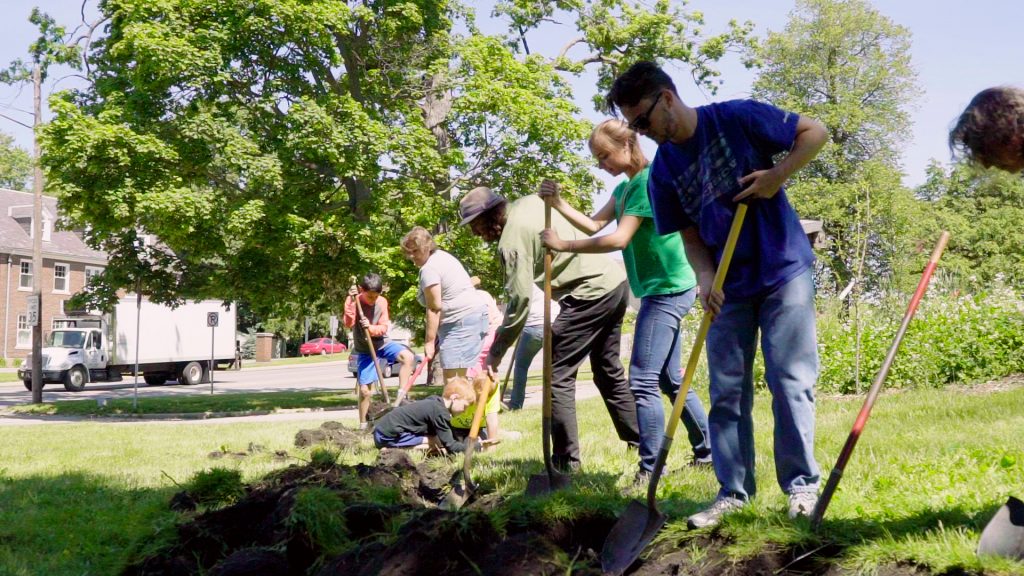
- Fruit trees: peach, pear, apple, and plum
- Legume trees: locust, redbud
- Shrubs layer: honeyberries
- Herbaceous layer: asparagus, rhubarb
- Ground cover: clover, daylilies, strawberries
Bertrand Farm plans to add pollinators, herbs, and comfrey this fall.Initially they faced some planting issues, since some of the plants they wanted weren’t available to plant in the spring, but they quickly created a backup plan with reserve fruit trees to plant if needed. Drought and grass pressure also caused issues in the initial planting stage, but lessons have been learned for future farming.
The grant has already had positive effects: some 60 acres of leftover trees from Bertrand Farm’s orchard guild were donated to a local school yard, where they’ve helped to educate both children and parents about preconceived notions of agriculture and the beauty of an unkempt farm!
Soil Born Farms
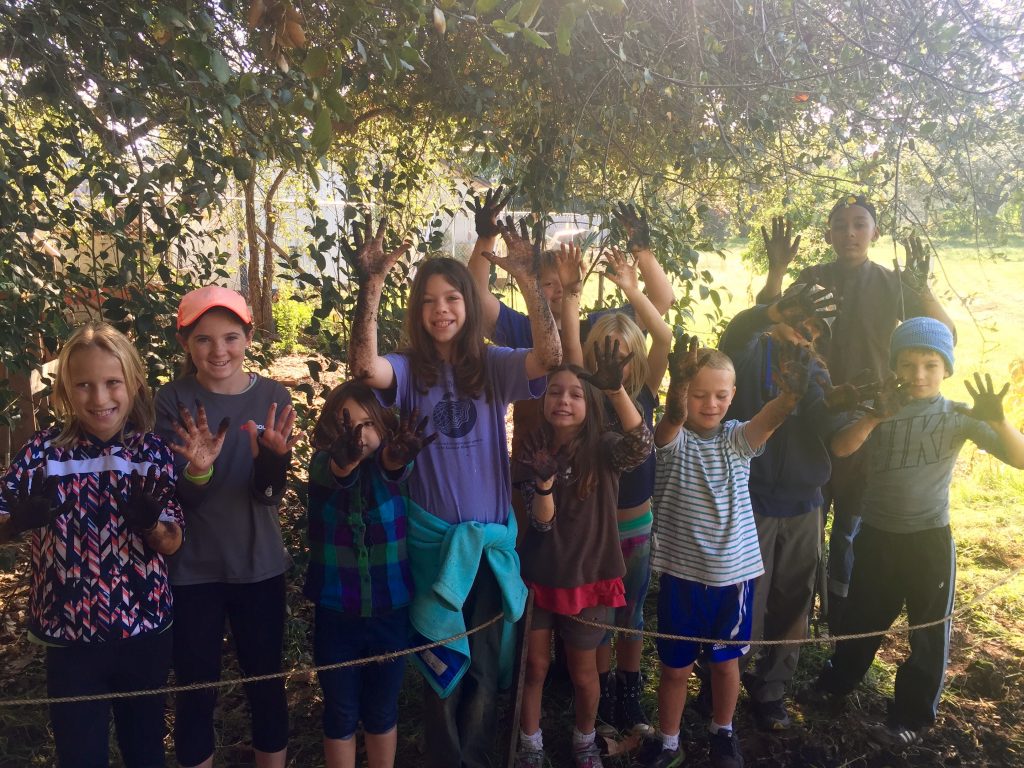 Soil Born Farms, a nonprofit farm in Rancho Cordova, CA, grows various fruit and vegetable crops on 55 acres. Their $5,000 grant has allowed them to purchase a no-till seed drill.
Soil Born Farms, a nonprofit farm in Rancho Cordova, CA, grows various fruit and vegetable crops on 55 acres. Their $5,000 grant has allowed them to purchase a no-till seed drill.
So far, Soil Born Farms has been preparing their land for the no-till seed drill, which they could use in late fall. The initial work has primarily been weed suppression, including the use of cover crops and silage tarps, and this has kept them on track for the new drill’s arrival.
Shawn Harrison, farm co-director, says, “We are being very thorough with the selection and sourcing of the appropriate seeder. This purchase will prove critical to the success of our soil management plan. Currently we are finding the cost of no-till seeders to be far in excess of our budget. Alternatives exist [for] building the seeder ourselves … and we are currently focusing our efforts on this option.”
Marsteller Farm
Marsteller Farm, a family farm just under 4.5 acres in Freeland, MD, produces a wide variety of chemical-free vegetables, pastured eggs, and pork. They received a $5,000 grant that will allow them to extend their growing season and diversify crops.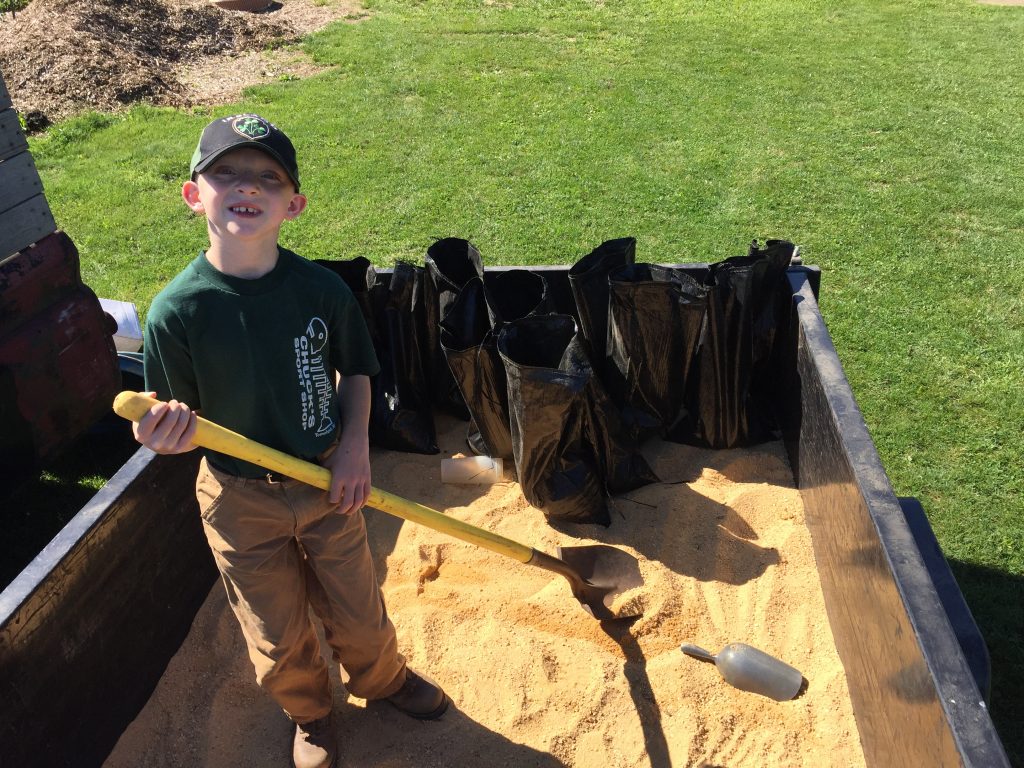
Marsteller has successfully planted a perennial pollinator garden, and their high tunnel was delivered in late August, but only after some initial changes to their timeline. “We made adjustments to our original plan in early spring, when we made a connection with a perennial wholesaler. We were able to save a lot of money on plants and [were] able to start with potted plants instead of bulbs and tubers, but we had to take delivery right away. So instead of getting straight to work on the tunnel, we first planted our perennial pollinator bed. Then we more or less fell into free mulch, and we again were able to save, so that more of the tunnel cost would be covered by the grant,” said farmer Jessica Beck.Economizing has helped them stretch their grant further, which has put them in a good position for creating their tunnel. Unfortunately, they feel they’re struggling to get people in the community excited about growing their own healthy food, but they plan to keep trying and are hopeful they can help create change. They’ve been able to help create excitement about innovative agriculture and healthy eating with their farm tours and at a healthy kids expo in Shrewsbury, PA.
The Growing Club – Sarvodaya Farms
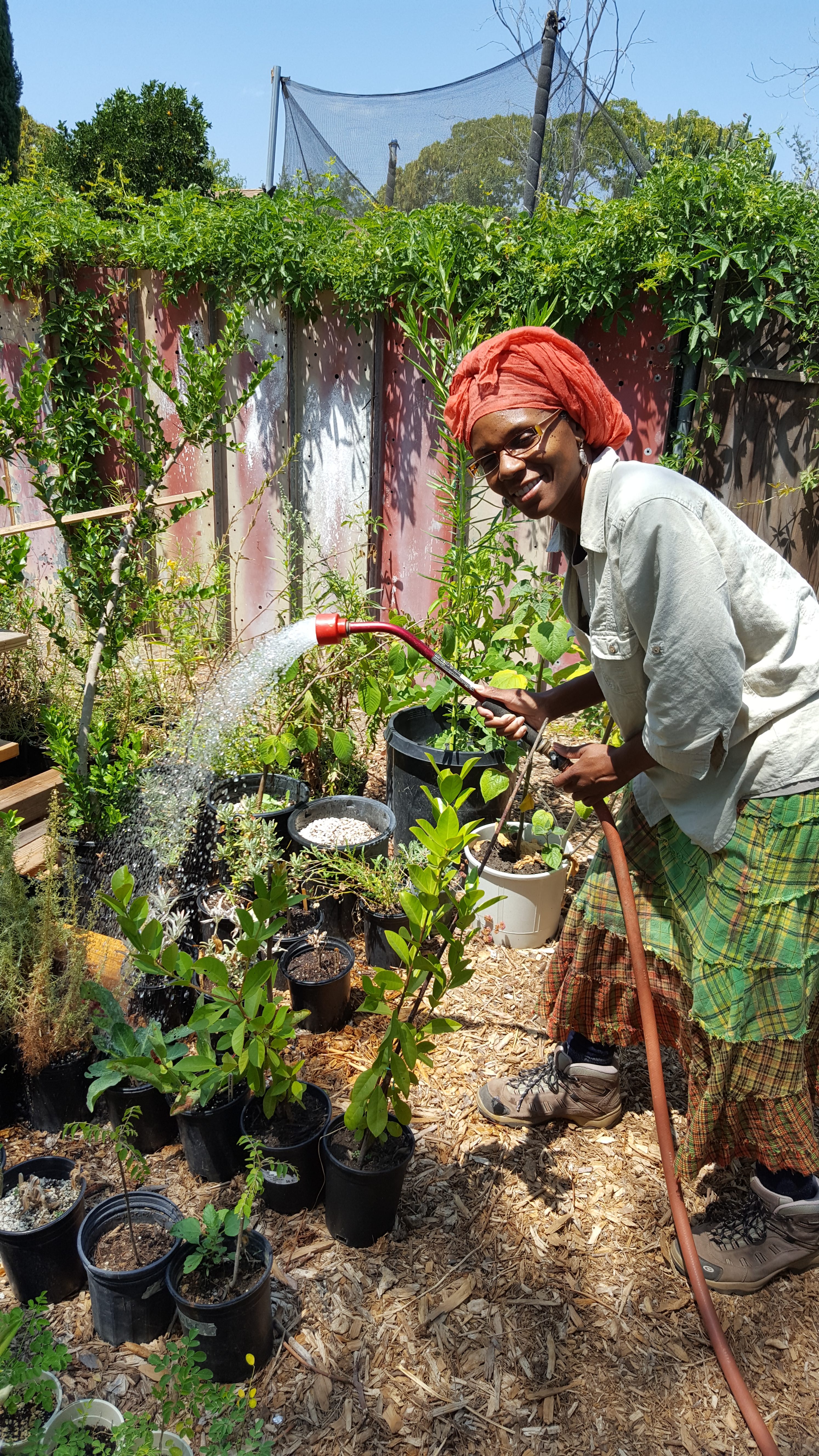 The Growing Club – Sarvodaya Farms, a nonprofit educational farming program in Pomona, CA, requested a $4,996 grant to help establish four California native perennial hedgerows.
The Growing Club – Sarvodaya Farms, a nonprofit educational farming program in Pomona, CA, requested a $4,996 grant to help establish four California native perennial hedgerows.
Sarvodaya Farms has stuck closely to their initial timeline. As soon as the grant confirmation was received, they sketched their plan for which fruit trees and which native plants would be planted and where they would be located. They also ordered all irrigation materials promptly and could install them very quickly. Next, they picked up all the fruit trees and planted them on the farm which was completed around May 12. Since May, the focus has been on procuring local plants and developing their farmer training program to help educate people on farming with native California plants.
So far the biggest challenge they’ve faced has been navigating the unseasonably hot summer, which has caused issues with their new crops. However, they are confident that as the weather cools, their new plants will bounce back.
Blackhawk Courts Farm and Garden
Blackhawk Courts Farm and Garden is a half-acre community-led organic farm and garden on the grounds of Rockford Housing Authority in Rockford, IL. Their $4,100 grant will help them carry out soil testing, create compost, put in cover crops, and plant perennials to help improve soil health and attract and support pollinators.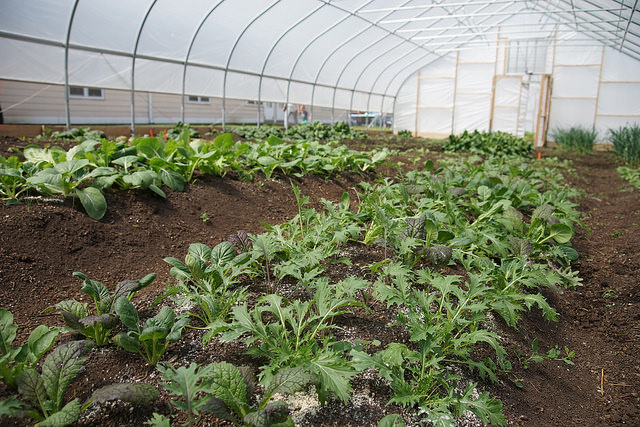
To date, they have purchased cover crop seeds, perennial raspberry tree seeds, perennial herbs, asparagus, and strawberries. They started by planting a portion of the cover crops in some sections of the farm in spring and plan to plant the rest of the crops and plants this fall. They also purchased and applied a portion of the compost this spring, and plan to purchase and apply more in the fall. Finally, they will conduct the soil test this fall, after their first full season of growing in their new hoop house.
The big successes so far focus around outreach into the local community. The farm and garden is on Rockford Housing Authority’s Blackhawk Courts public housing property; the farm specifically seeks to engage Blackhawk Courts residents as leaders of the project through a summer job-training program and community events. This summer, they’ve been working with four adult apprentices and three youth apprentices, and they’ve hosted 28 workshops and training events, with over 90 people taking part in their training courses.
Urban Tree Connection – Neighborhood Foods Farm
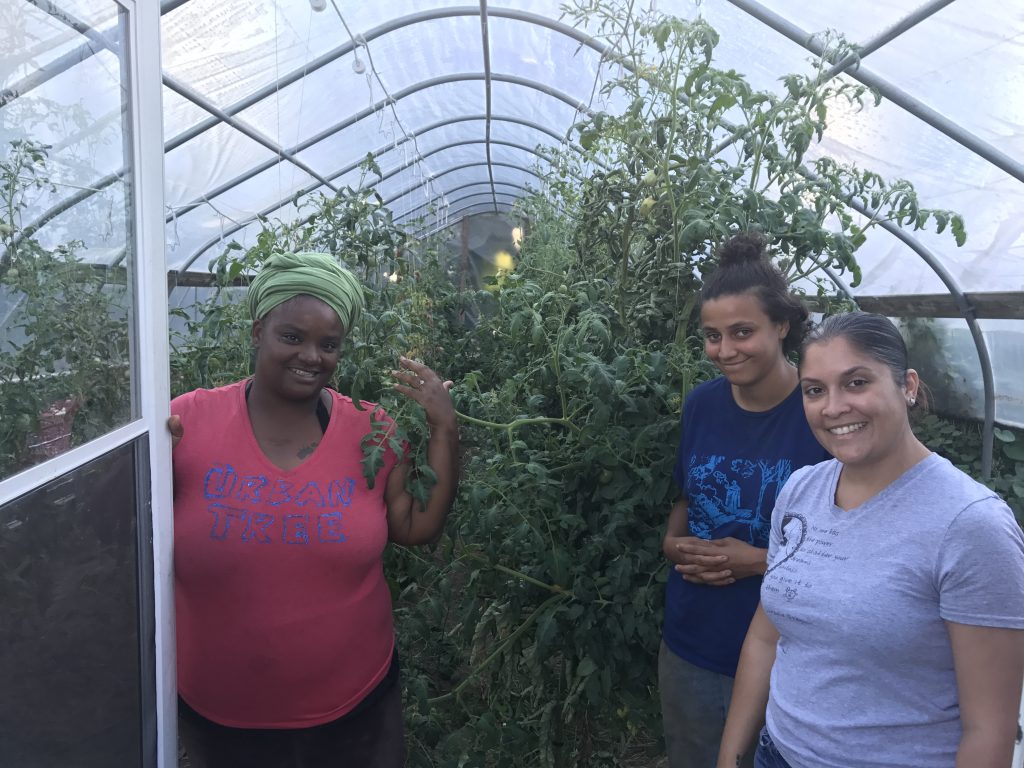 Urban Tree Connection – Neighborhood Foods Farm is a nonprofit organization in the Haddington neighborhood of West Philadelphia that has been supporting community-led land reclamation projects since 2010 on their three-quarter-acre farm. Their $2,500 grant will help start a seed-saving project that incorporates culturally important seed varieties, and will help build an education program for the local community.
Urban Tree Connection – Neighborhood Foods Farm is a nonprofit organization in the Haddington neighborhood of West Philadelphia that has been supporting community-led land reclamation projects since 2010 on their three-quarter-acre farm. Their $2,500 grant will help start a seed-saving project that incorporates culturally important seed varieties, and will help build an education program for the local community.
The seed-keeping project has gotten off to a great start, quickly building to capacity. To date, all the crops have been planted, and Urban Tree Connection (UTC) has started the seed-saving process for the tomatoes, asparagus, and sweet potatoes. The okra and sorghum were planted a little later than expected, and will be seeded next month.
This year, UTC farmers have focused on building up their knowledge base and sharing what they’ve learned through community education workshops. They also added another member to their team to help with the seed-saving process, which was more complex than initially expected and delayed their summer workshop plans.Now that the seed-saving process has been completed, they will resume hosting workshops this fall and into the winter. They also plan to pilot selling seeds at markets and sharing at swaps this year.
Dishing the Dirt on 2018
The 2017 grantees will share final highlights from their sustainability projects at the end of the year. Do you know a small independent farmer? The FruitGuys Community Fund will open the 2018 grant cycle in December 2017.
Want to get involved? Volunteer for our Grant Review Committee! You can help decide which projects get funded in 2018.




